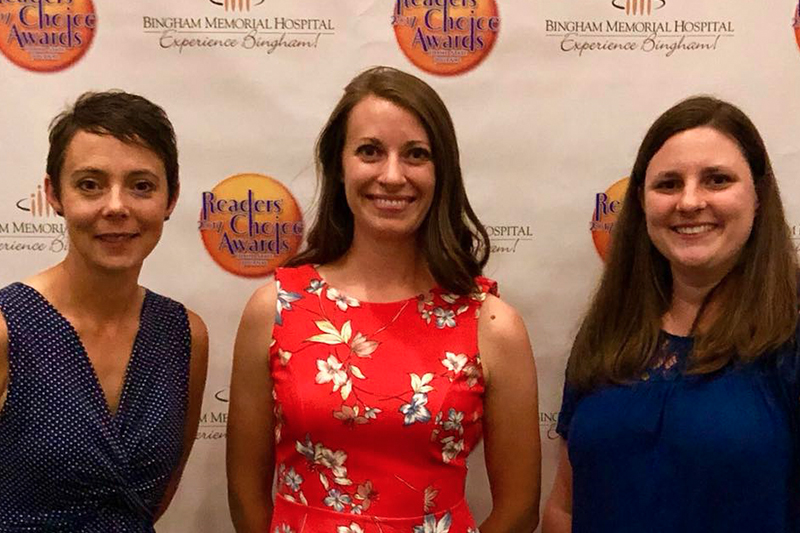ISU Audiology & Idaho Condor Spend Spring Break on Humanitarian Mission to Peru

ISU/Idaho Condor audiology team members, from left, ISU audiology professor Gabe Bargen, alumni Jacob Diller and Deanna Gende, and second year audiology student Bailey Neuhaus
A recent collaborative humanitarian mission with Idaho Condor and Idaho State University has left several Peruvian villagers hearing more clearly, and one ISU student seeing more clearly. For the third year in a row, students, faculty and alumni of ISU’s audiology department traveled to Peru to provide audiology services for villagers there, equipping 24 of them with new hearing aids. One student, Bailey Neuhaus, was particularly impacted by her experiences on the trip and says she now knows exactly what she wants to do when she completes her schooling at ISU.
Neuhaus, a second year audiology student, was accompanied by Gabe Bargen, Ph.D., associate professor of audiology at ISU-Meridian in the Department of Communication Sciences and Disorders, along with two ISU audiology alumni, Jacob Diller, Au.D., of Boise and Deanna Gende, Au.D., of Long Beach, CA. This is the third year Diller has made the trip, researching the first year to see what the needs were for the Peruvian villagers, then going back to help in the delivery of their care.
Idaho Condor also has a Peruvian physician working with them to determine the needs of villagers and where the services would be most beneficial. Idaho Condor is a national non-profit organization working to provide medical care at no cost to the indigent of Peru. In addition to audiology services, care volunteers in the areas of young women’s health, dental, pharmacy, and nursing made the trip to provide their services. Dr. Rex Force, vice president for Health Sciences at ISU said, “These experiences are so important for faculty and students. The cultural perspectives that can be brought back to the classroom and to our clinic settings really enhance the learning and practice environment here in Idaho.”
The audiology team this year saw 204 people as they traveled through five different villages near Cuzco, Peru during Spring Break, March 17-27. The patients were mostly adults and just a few children, many walking for several hours to then stand in line for audiology services including hearing tests and ear cleanings. Of the total, 24 were given a hearing aid and a one-year supply of batteries. The hearing devices were donated by manufacturers ReSound and Oticon, while the batteries were donated by a battery manufacturer based in China called Zeni Power. The materials to make the earmolds were donated by Westone. “We looked in their ears, and removed ear wax from 62 of the people. We looked for infection, and saw 6 ear infections,” Neuhaus said. “We also fit several individuals with hearing protection, such as ear plugs, because of where they worked. Some of those in the farming and construction industry didn’t understand the importance of protecting their ears from loud sounds, and wondered why they would need to wear ear plugs,” Neuhaus said, “The translator explained that it would help keep their hearing from getting worse.” In the end, Neuhaus said one of the most interesting parts of the trip was that the translator assigned to the audiology team was able to give the villagers instructions about their devices and recommendations about their quality of hearing, without any guidance from the audiology team.
Both Neuhaus and Bargen said they would like to go to Peru again with Idaho Condor. Bargen said, “My favorite part was watching Bailey, Jacob and Deanna work, being that I taught all three of them. There were moments where I could stop and look around the room and see all three of them working and functioning on their own and it was awesome to see that.” Neuhaus said, “I don’t want to take anyone’s spot, but I would definitely go again if other students don’t want to go. We learn in class how important communication is and it was really great to see them interacting with their families after we fit them with a hearing aid, or we cleaned their ears and they were able to hear better. It was really cool. I had a pretty good idea that I wanted to do outreach in my career and now it has really sunk in that this is what I want to do. It doesn’t have to be in a developing country, even helping people in the US, who might not have the access that I have to healthcare.”
